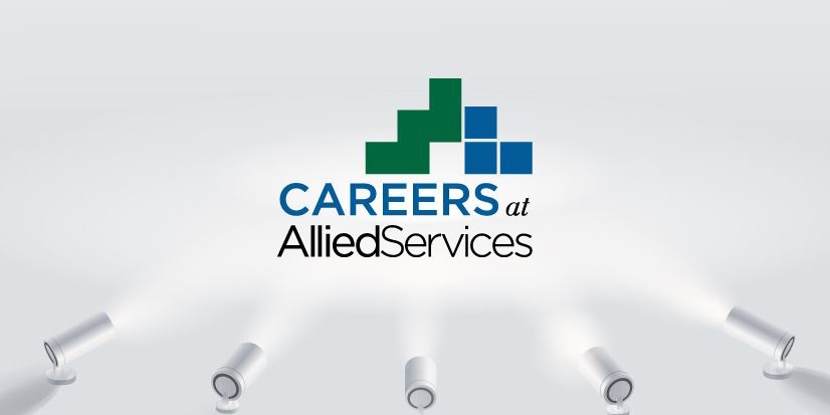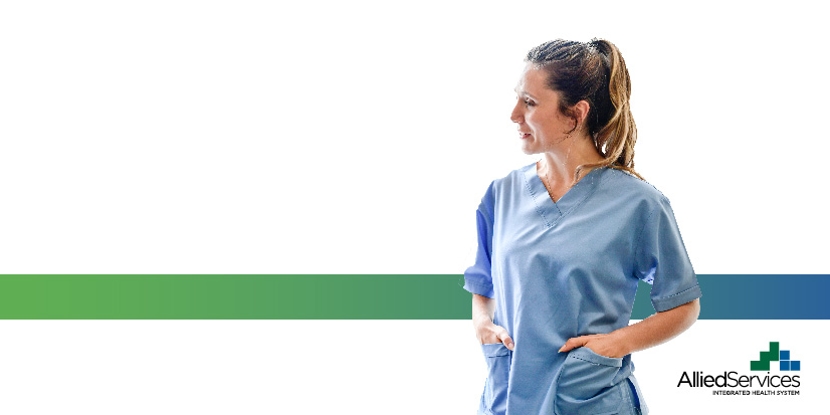Stroke recovery takes a village
- Category: Stroke Recovery, Occupational Therapy
- Posted On:
- Written By: Allied Services Integrated Health

Having a stroke is a life-altering event. Recovery from a stroke is dependent on many factors including severity, location, and previous medically-related physical impairments. The recovery process is different for everyone. Although it is hard to predict how an individual’s recovery will progress, knowing some of the steps along the way can help to provide motivation and hope for the stroke survivor and their family.
The location of a stroke in the brain will determine the physical impairments that will affect the ability to function in everyday life. Common deficits include weakness of one side of the body, visual disturbances, trouble speaking, swallowing, and impaired thinking skills.
Rehabilitation after a stroke takes a village. There is the medical support group that is made up of physicians, nursing, physical therapy, occupational therapy, speech therapy, social work, and rehab counseling. There is also the individual’s personal support team.
Recovery frequently requires a “continuum of care”, which may include the following:
- Inpatient rehabilitation
- Skilled nursing
- Home health
- Outpatient rehabilitation
Depending on the severity of the stroke and extent of the deficits, an individual may move through some or many of these levels of care
Inpatient rehab is frequently the first step in the continuum. After evaluation by the rehab team, a plan of care and goals are determined for the patient. This plan is adjusted weekly as needed based on the patient’s progress. The patient is included in this goal-setting process to ensure that their plan works for them while also helping with their recovery.
A strong personal support system can make a big difference in a patient’s recovery and their ability to return home or transition to the next level of care safely. Spouses, family members and friends may be part of this caregiving group.
When appropriate, support members will be invited to attend family training where they will learn how to assist the stroke survivor with self-care and mobility. Education is provided on the individual’s current abilities and limitations, medication administration, medical equipment recommendations, and the next step in the continuum of care.
At discharge from inpatient rehabilitation, most individuals will transition to home health or outpatient rehab services. However, some individuals may require skilled nursing services to further improve their functional abilities before safely retuning home.
When the patient is ready to return home, they may need home health services. This is most often prescribed for those who may be homebound for a period of time or may have limitations in caregiver support or transportation. If the individual would benefit at this point from continued therapy, the person may transition to outpatient services. These services provided are ordered by the physician based on the person’s ongoing need to regain further independence.
The stroke survivor’s support team continues to be of great importance; assisting with the person’s daily self-care, mobility, medication administration, and carryover of therapy programs.
A person’s length of stay in inpatient rehab or sessions provided during home health or outpatient rehab are based on their progress and goal attainment, leading to the regaining of as much independence as possible.
Stroke recovery is a dynamic process which may take a year or more, depending on stroke severity and the body’s ability to heal. Participation in a therapeutic continuum of care with a strong support team will ensure the greatest level of recovery and allow a stroke survivor to reclaim their independence.
About the Author: Carol Weisenfluh, OTR/L, is Stroke Program Manager at Allied Services Scranton Rehab Hospital. She works closely with patients and families to ensure the best outcomes in stroke recovery.
Stroke Recovery at Allied Services
Our inpatient and outpatient stroke rehab programs address physical, cognitive, behavioral, and socialization needs as well as identify and manage risk factors to help prevent future strokes. To learn more:
- Scranton: 570-348-1360
- Wilkes-Barre: 570-826-3900
- Learn about stroke recovery here



